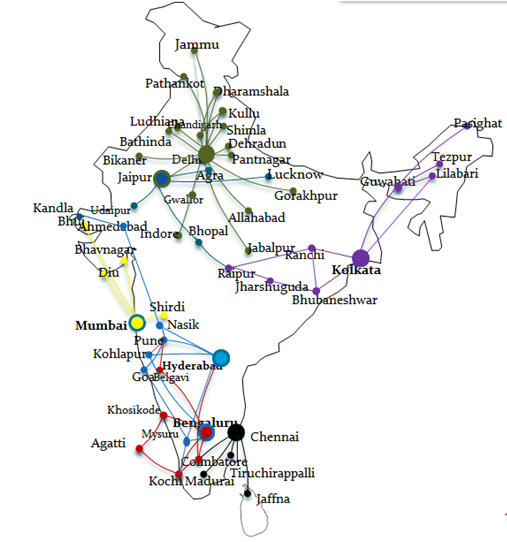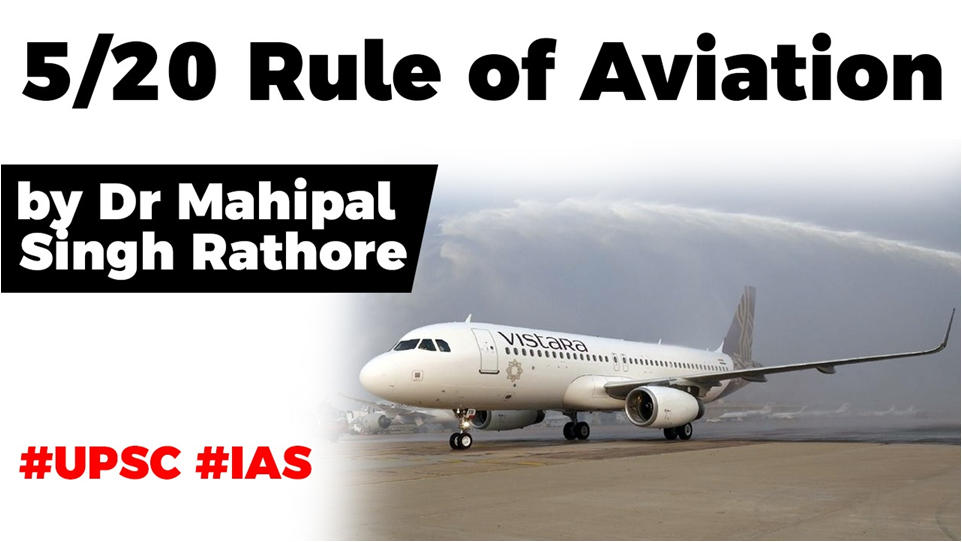Table of Contents

The News
- The Union cabinet recently approved an ex post facto (with retrospective force) rule, waiving the ‘5/20 rule’ for Air India’s subsidiary Alliance Air to conduct flight operations between India and Sri Lanka.
Alliance air
- Alliance air is a wholly owned Subsidiary of Air India Limited
- It operates air services to 56 destinations with a fleet of 18 ATR 72-600 (70/72 Seater) and 1 ATR 42-320 (48 Seater) aircraft.
- Flights are operated mostly to Tier-2 and Tier-3 Cities or those which link these cities to the metro hubs

What is 5/20 rule?
- The 5/20 rule is a norm of the Indian Aviation Ministry under which national carriers are required to meet following criteria to fly overseas –
- Five years of operational experience
- A fleet of minimum 20 aircraft
- This is applicable to all commercial aviation organisations flying passengers.
- Alliance air does not have the required 20 aircraft currently.
- However, in November last year, it started operating thrice-weekly flights on the Chennai-Jaffna route.
- Govt justified the exception by stating that
- There are many Tamils in Sri Lanka who need connectivity to Tamil nadu.
- India has close bilateral ties with Sri Lanka and our interest is to increase connectivity and to expand people to people contacts between the two countries.
Why did the Govt have this rule?
- The rationale behind this rule was that the airlines can have solid financial and security credentials by flying in the domestic sector for 5 years and a fleet of 20 aircraft.
- This rule had stifled competition and meant that in part, Air India has run a quasi-monopoly on the sector.
- Hence there had been demands from time to time to scrap this rule.

Why are Indian airlines unhappy with this rule?
- The 5/20 rule has been strongly opposed by airlines
- They say it is hindering the growth of the aviation sector in India.
- Due to this rule, the airlines cannot fly on any lucrative international profitable route before they have 5 years of flying experience and 20 aircraft.
- No other country has this rule except India, which means international airlines flying to and from India can do so irrespective of the operational experience and aircraft fleet.
- Experts believe that scrapping 5/20 rule would encourage new players and bring in more investment in the aviation sector.
- On the other hand, the carriers who started international flying under this rule are opposed to government scrapping or relaxing 5/20 rule as they see it as an unfair advantage to the new entrants which vitiates the level playing field.

Govt Stance 5/20 to 0/20
- The government has not been able to decide whether this rule should be scrapped or relaxed or replaced by something else (like Domestic Flying Credit).
- The 5/20 rule helps the airlines fulfilling their domestic flying obligations and thus providing connectivity to the country.
- In 2016, National Civil Aviation Policy stated that the 5/20 norm was to be replaced with 0/20 .
- Thus, allowing airlines to launch international operations with no domestic experience but at least 20 aircraft.
Indian Aviation market
- Domestic traffic in India rose by a staggering 18.6% year-on-year to 138.97 million in 2018.
- The Indian domestic passenger market is very price-sensitive, and so margins remained very low.
- This means that international routes are the only sector where airlines can achieve much of their profitability and margins.
Latest Burning Issues | Free PDF






















 WhatsApp
WhatsApp